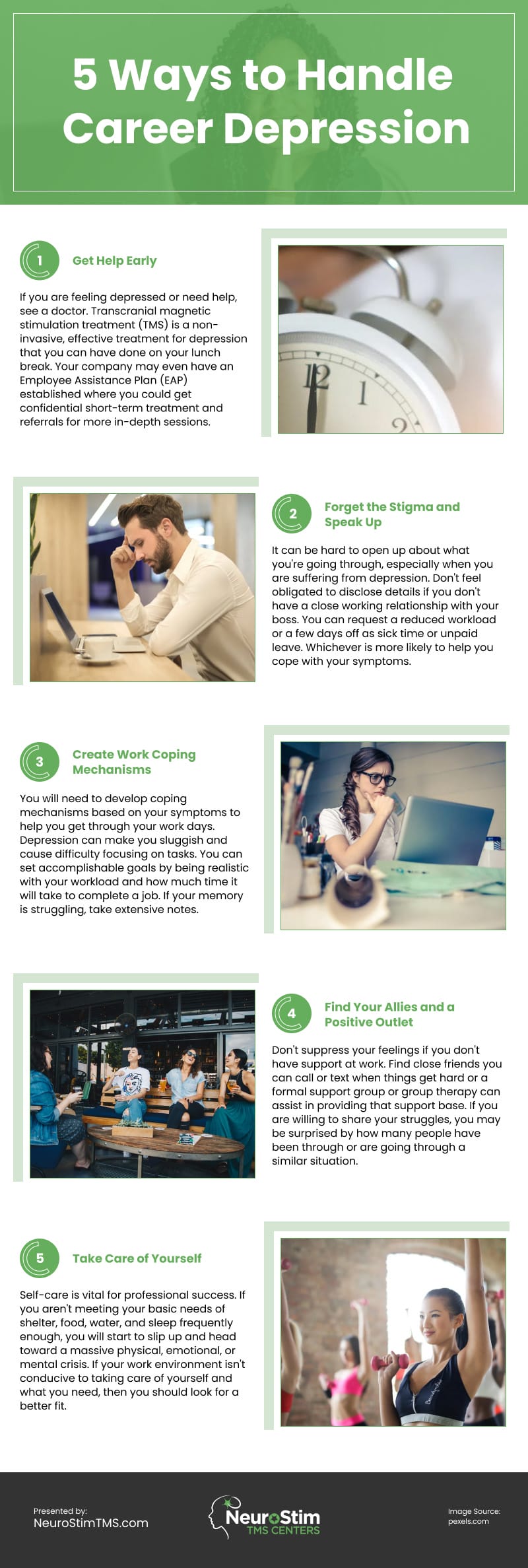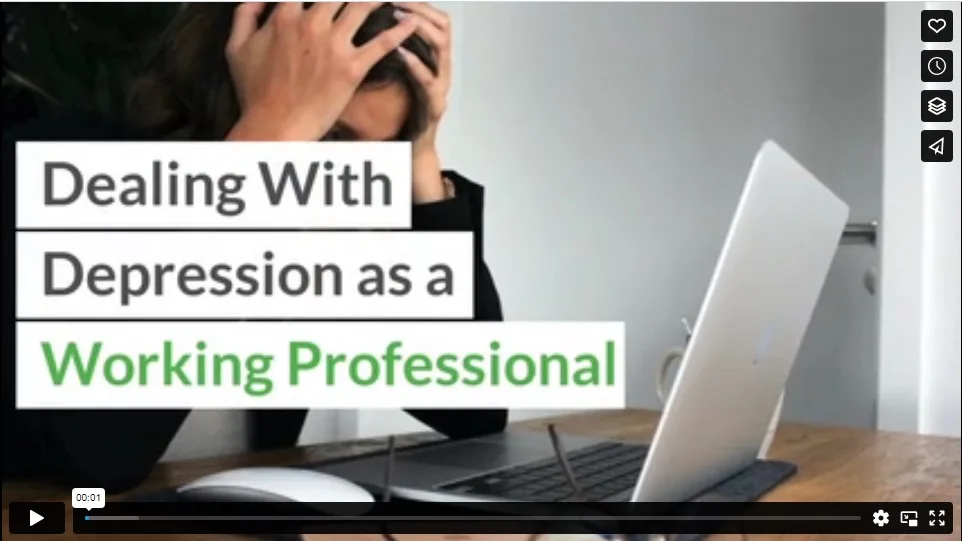According to Unum’s Strong Minds at Work report, 62% of missed work days are because of mental health conditions. 55% of workers were unsure if their company had programs to help or knew they didn’t. And this survey was collected pre-COVID, when mental health problems weren’t affecting as many of the population. It’s one of the top causes of worker disability.
Dealing with depression alone is challenging. And if your workplace doesn’t actively support you, trying to overcome your symptoms while juggling your responsibilities is nearly impossible. Here are the top five tips to help you cope with your depression as a working professional:
1. Get Help Early
If you have dealt with periods of depression before, you know how to recognize the signs or triggers and seek professional help before things get bad. If you haven’t, but you are questioning if you are depressed or need help, see a doctor. Your company may even have an Employee Assistance Plan (EAP) established where you could get confidential short-term treatment and referrals for more in-depth sessions.
If your depression has been a lifelong struggle or yet another medication has stopped working effectively, you should speak to your practitioner about alternative treatment options. Transcranial magnetic stimulation treatment (TMS) is a non-invasive, effective treatment for depression that you can have done on your lunch break. You will often start to see improvement more quickly with TMS than with traditional medication.
2. Forget the Stigma and Speak Up
Because of the stigma associated with mental health problems, it can be incredibly hard to open up about what you’re going through, especially when you are suffering. If you have that relationship where you feel comfortable sharing with your boss, let them know that what is likely showing up in your work isn’t a lack of interest or effort but a symptom of the depression you are going through.
Don’t feel obligated to disclose details if you don’t have that kind of work relationship. However, you should speak to HR to determine the best approach as you work through your depression. You can request a reduced workload or a few days off as sick time or unpaid leave. Whichever is more likely to help you cope with your symptoms as you need time to regroup to maintain your professionalism.
3. Create Work Coping Mechanisms
You will need to develop coping mechanisms based on your symptoms to help you get through your work days. Since depression can cloud your judgment and perception, having professional input about what negative patterns they are seeing and what strategies have worked in the past are beneficial.
For example, set clear goals. Depression can make you sluggish and cause difficulty focusing on tasks. By being realistic with your workload and how much time it will take to complete a job, you can set accomplishable goals that will help keep you on task.
If your memory is struggling, take extensive notes. Set reminders for yourself in your calendar for meetings, deadlines, and anything else you use to remember without writing it down. Take mini mental health breaks that you build into your day, so you’re not waiting until you’re at your breaking point or so overwhelmed you’re crying in the office bathroom.
4. Find Your Allies and a Positive Outlet
Finding an ally at your workplace can be challenging if you don’t already have trusted friends there. If you are willing to share your struggles, you may be surprised by how many people have been through or are going through a similar situation.
Don’t suppress your feelings if you don’t have support at work. Find another way to get help. Find close friends you can call or text when things get hard or a formal support group or group therapy can assist in providing that support base.
5. Take Care of Yourself
Despite what our capitalistic society perpetuates, self-care is vital for professional success. Long lasting, satisfying success that is. If you aren’t meeting your basic needs of shelter, food, water, and sleep frequently enough, you will start to slip up, make mistakes, and head toward a massive physical, emotional, or mental crisis.
If your work environment isn’t conducive to taking care of yourself and what you need, or your work or colleagues are part of the cause of your depression, then you should look for a better fit.
As Mark Twain said, “find a job you enjoy doing, and you will never have to work a day in your life.” While you still may feel like it’s a job at times, find work that isn’t the source of your stress or contributing to your mental health issues. There are many jobs with supportive supervisors, trained mental health professionals on staff, mental wellness programs, initiatives, and policies. Look for collaborative, supportive, flexible work environments where you can thrive.
Most importantly, when in doubt, get help; through formal therapy, medication, counseling, support groups, alternative depression treatments, or through your work, family, and friends. Open up about what you are struggling with, and you will find many like you who have wise words of experience to share.
Infographic
Based on Unum’s Strong Minds at Work report, it shows that mental health conditions significantly impact workdays, with 62% of missed workdays resulting from these issues. 55% of workers are uncertain about their company’s supportive programs or aware of their absence. Mental health challenges have likely escalated since COVID-19, emphasizing the need for comprehensive workplace assistance to address mental health concerns and foster employee well-being.

Video

